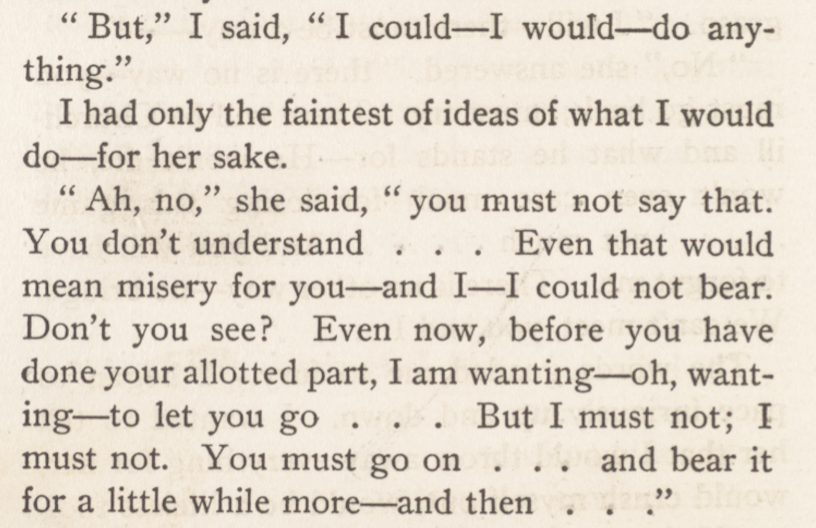|
If you could, Brainworm, could you talk about how you think Catch-22 in particular is a good read and how it's effective? It was something you mentioned a while back in comparison to Things They Carried and Slaughterhouse Five.
|
|
|
|

|
| # ? Apr 27, 2024 15:09 |
|
You might be the wrong guy to ask, maybe a high school english teacher would be moe appropriate, but here it goes anyway. Where are people learning to put elipses all over their writing? The first person I ever noticed doing this was my father who has no explanation, but I see this poo poo everywhere, on the forums, posters, signs, public notices, personal letters, just all over the place...people will just add... an elipses...or twelve... I don't understand... How is this so common? My sister does this as well and while she can't remember where she got the habit, she says that she puts one down when she is thinking. As in, when she is in the middle of writing a letter and is pondering what to put down next, she jots down an elipses.
|
|
|
|
MettleRamiel posted:You might be the wrong guy to ask, maybe a high school english teacher would be moe appropriate, but here it goes anyway. Where are people learning to put elipses all over their writing? The first person I ever noticed doing this was my father who has no explanation, but I see this poo poo everywhere, on the forums, posters, signs, public notices, personal letters, just all over the place...people will just add... an elipses...or twelve... I don't understand... How is this so common? I think a lot of people are compelled to use punctuation as a tool to faithfully reproduce how they talk in their heads.
|
|
|
|
This is part of an ongoing and very interesting discussion about the difference between written and spoken language. If I had to take a crack at explaining it, I'd say it's because we do so much non-verbal communication these days, and we can't read the emotions of the writer. Because English doesn't have an "official" formal or literary tense, we tend to waffle on the emotion conveyed by punctuation. Take, for example, how different a texts reading: "I'll do it" which will be received differently from "I'll do it!" or "I'll do it..." or "I'll do it  " will be received by the reader. " will be received by the reader. Seinfeld has a great bit about this in the episode "The Sniffing Accountant" where Elane gets terribly upset because her boyfriend didn't put an exclamation point on a note he left. quote:Elaine: Well, I was just curious why you didn't use an exclamation point? On the other hand, there's a social dynamic as well. This African architecture PhD student who wrote their entire dissertation without punctuation, instead using spacing and word emphasis to convey the pauses and breaks. quote:
(Edit: BBcode won't preserve the spacing correctly, the true version is in the article below) http://news.nationalpost.com/news/canada/ubc-student-writes-52438-word-architecture-dissertation-with-no-punctuation-not-everyone-loved-it He did receive his PhD. Toph Bei Fong fucked around with this message at 18:15 on Feb 5, 2016 |
|
|
|
IXIX posted:If you could, Brainworm, could you talk about how you think Catch-22 in particular is a good read and how it's effective? It was something you mentioned a while back in comparison to Things They Carried and Slaughterhouse Five. I want very badly to do this but I need to re-read Catch first. The last time I picked it up (probably a year ago) I never finished it because I noticed the book was deeply allusive and I was too impatient to tease out everything I saw. There are intentional connections to Shakespeare and Rabelais and Kafka, but its comic sense veers from absurdist to Victorian in a way that most reminds me of Three Men In a Boat.
|
|
|
|
MettleRamiel posted:You might be the wrong guy to ask, maybe a high school english teacher would be moe appropriate, but here it goes anyway. Where are people learning to put elipses all over their writing? The first person I ever noticed doing this was my father who has no explanation, but I see this poo poo everywhere, on the forums, posters, signs, public notices, personal letters, just all over the place...people will just add... an elipses...or twelve... I don't understand... How is this so common? It's weird, right? I first noticed the convention of using ellipses in video games -- ye olde kynde where character dialogue is captioned at the bottom of the screen. There, of course, it means that a character trails off or pauses in the middle of a sentence. That's aposiopesis, and it goes way, way back. Lear does it when he gets worked up, since he's an old man: King Lear posted:I will have such revenges on you both, And Shakespeare uses it in other places, too. Hotspur's last words are "no, Percy, thou art dust / and food for --". Ben Jonson, whose characters speak more naturally than Shakespeare's, uses them all over the place. And Brecht, I mean gently caress it. Ellipses are like half the ink mass of a Brechtian script. I couldn't find a pre-Shakespearean example of aposiopoesis, though. Luckily, there's a whole history of the ellipsis: Toner's Signs of Omission. It's probably not going to see paperback, my library can't get it as an ebook, and I'm not going to drop a C note of my library's budget to pick it up, but the reviews say she dates the earliest English printed aposiopoesis to 1588 (although it appears in handwritten notes much earlier). There, and elsewhere, the aposiopoetic punctuation of choice is an em dash rather than the ellipsis, so I think there are actually two questions in play: (1) When did people start using ellipses to indicate aposiopesis? (2) When did aposiopoetic writing become so widespread? Given that I haven't read the book that, you know, could answer both these questions certainly, I'm just going to shoot from the hip. The Birth of the Aposiopoetic Ellipsis Just trawling through my book collection, I see aposiopoetic ellipses a lot in 20th century character dialogue -- especially in my cheapass paperbacks (but more on that later). A review of Toner's article pointed me to Conrad's Inheritors (1901), which she may (or may not) claim is the earliest example. It's littered with aposiopoetic ellipses, as you can see here:  But I can get a little earlier than that. Once I knew I had to beat 1901, I looked at books that seemed like good candidates (Frankenstein) only to find that they used em-dash ellipses exclusively. And then I checked George Meredith (who in hindsight probably should have been my first choice). There aren't any ellipses in Shaving of Shagpat, but there are in Ordeal of Richard Feverel; the Gutenberg edition is the 1905 printing, but Ordeal was published in 1859. I'm assuming the 1905 edition is faithful to the original w/r/t its use of ellipses; if not, they show up in later Meredith like Diana of the Crossways (1885). So 1859? That sounds good to me. I'd need to find an original printing of Feverel to verify, though. The Aposiopoetic Mode It's probably not too much of a reach to suppose that aposiopoetic ellipses become more common in late Victorian and Modernist writing, since almost everything about that writing is more elliptical than what came before it. And if you don't buy that, you might buy the idea that writers have become increasing fascinated with capturing the rhythms of natural speech, and that as a result the aposiopoetic ellipsis is more welcome in polite company. Apart from that, I've got nothing except that I've noticed more of those ellipses in mid-range genre fiction than in, say, novels whose style is not in intrusively bad. A brief survey of my popular fiction says there are at least three basic techniques for introducing pauses into dialogue. The first involves throwing in ellipses all over the place: A Text posted:"I don't know," he said nervously, "the colors were...in my mind somehow...not light, but darkness visible." And, honestly, it kinda sucks. It's hard to pinpoint why, other than that the ellipses seem intrusive. The point of them is clear, but they don't fade into the background the way punctuation should. The second technique involves using dialogue attribution tags to create a pause. There may be a better term for this, but I'ma call it a non-diegetic technique. Douglas Adams does this like a madman: B Text posted:"I," he said, "don't know. And what's more, these colors you claim to have seen have been glossed by an allusion so painfully overdetermined that a bevy of succubi prancing around a flaming crucifix would seem the pinnacle of understatement." The third is also non-diagetic, and involves breaking away from dialogue to describe something else. C Text posted:"I don't know," he said. His fingers plucked the edges of the blanket. "The colors were in my mind, somehow." He looked across the room, at the copy of Paradise Lost sprawled in the corner, and ran a hand through his hair. "It wasn't light," he said, fingers stealing back to blanket's fraying edge. "It wasn't light, but darkness visible." With those three all in one place, I get a better sense of why the ellipses seem like hacks: they don't convey anything other than that there should be a pause, and every time they do, they snap me out of imagining whatever's being described.
|
|
|
|
Brainworm posted:I couldn't find a pre-Shakespearean example of aposiopoesis, though. There's the famous example in the Jew of Malta (1589), although the first extant text is from 1633. FRIAR BARNARDINE. Thou hast committed -- BARABAS. Fornication: but that was in another country; And besides, the wench is dead. Mr Enderby fucked around with this message at 17:35 on Feb 8, 2016 |
|
|
|
In Dubliners, Joyce uses aposiopesis extensively to indicate moments that aren't just pauses, but also the characters grasping about and self-censoring their thoughts for one reason or another as they verbalize them. He even tips it off by having the young narrator of the first story, "The Sisters," draw attention to the word gnomon in the first paragraph of the collection, to make sure everyone sees that they're supposed to pay attention especially to the missing parts—although he also uses ellipses of varying lengths, most commonly four or five dots, sometimes following a full stop. He may have gotten the device from Conrad, or from Ford Madox Ford (or both of them together, if he was one of the few people reading their bizarre, caustic science fiction novel The Inheritors). But soon after Eliot is ramming tons of them into "Prufrock," and Woolf is using it in place of "et cetera" in stories of hers, and modernist prose is by that point pretty thoroughly pointillist. As for precursors though, I'd have to think Sterne has a claim, as far as novels go; Tristram Shandy is doggedly elliptical in just about every conceivable way. elentar fucked around with this message at 04:25 on Feb 9, 2016 |
|
|
|
Hey Brainworm, I recently read Howl and loved it completely, so then I listened to a recording of Ginsberg reading it and thought that his reading was...well, terrible. How do you think poems should be read, stylistically? I feel that Howl is a fierce, passionate poem and when Ginsberg monotones the whole thing (like a traditional beat poet, I guess, or like a slam poet nowadays) I really thought it took away from it. Also, general observations and thoughts on Howl would be greatly interesting to read!
|
|
|
|
Does anyone know why people keep saying to me, when I tell them to have a nice day, "you as well?" I find it arbitrarily pretentious and unwarranted, like saying "utilize" instead of "use" or "persons" instead of "people". My theory is that people are conflating the words "too" - as in also - with "to", which is a preposition that one ought never end a sentence with. Also, I heard that the deal with ending sentences with prepositions was that it isn't officially a real rule of English, but like more of like a grassroots guideline that people adopted and immediately became self-righteous about. Any truth to that?
|
|
|
|
I think people say "you as well" because "you, too" reminds them of a lovely band, or at least circumvents the possibility of jokes being made about a lovely band. Less sarcastically, people will tend to avoid internal rhyme if they can help it because it sounds weird when it crops up in ordinary speech. The idea that a preposition can't go at the end of a sentence is true in Latin -- that is to say, if you're writing or speaking in Latin, a preposition will never show up at the end if you're doing it right, since prepositions always precede their objects in Latin grammar. In the 19th century a bunch of grammarians decided what was good enough for Latin was good enough for English and arbitrarily began to push it as a rule, despite the fact we had a well-worn history of speaking otherwise (and continue to speak so to this day). Sometimes, though, a preposition at the end of a sentence can actually be superfluous, eg, "Where is she at?" where "at" doesn't need to be there because "is" implies a location for its subject -- "Where is she?" This usage is colloquial and the preposition is often emphatic. If there's any case to be made for avoiding prepositions at the end of sentences, it's for situations like that, where you can convey the same idea in fewer words: "What did you do that for?" vs "Why did you do that?" But again, this is really more a technical approach to language than is needed in day to day speech, because both are perfectly comprehensible and, again, terminal prepositions often emphasize the statement in a particular way that may be useful depending on context.
|
|
|
|
Wow, that was incredibly insightful. Thanks!
|
|
|
|
Question: do you think English departments indoctrinate people to not empathise with others?quote:I put forth a proposition - literary 'merit' is a meaningless construct invented by English departments to justify their funding, giving them a reason to read too heavily into things and waffle on endlessly about devices that nobody else cares about. Your insistence on using it as a totally independent metric from subjective enjoyment is without substance, and is actually indoctrinated into you by said English departments, leaving you incapable of empathising with other peoples' experiences of art.
|
|
|
|
Got a source for that quote? Google turns up nothing. Also: "I put forth a proposition" is not only pretentious but redundant. Seems like that guy could use a few more English classes.
|
|
|
|
at the date posted:Got a source for that quote? Google turns up nothing. Also: "I put forth a proposition" is not only pretentious but redundant. Seems like that guy could use a few more English classes. There's a shitfit going on in the Book Barn over a stupid fantasy book. Lamps here is doing pretty good close reading but following up with what amounts to 'my opinion is objectively correct, you should feel bad for enjoying this thing you enjoy.' Other poo poo posters are poo poo posting in response. It's a glorious clusterfuck.
|
|
|
|
Since probably the 19th century at least, literary scholarship has basically staked its claim for legitimacy on some version of the idea that it enlarges the soul through some process of identification and empathy. While at first this only applied to "good" texts, at this point we're more interested in seeing how people's relationships to particular texts function as fantasies, which is to say, ways of imagining the real world in such a way as to grapple with what are otherwise apparently unsolvable problems. In other words, English departments have been over the idea of literary merit for at least 30 years by this point, now we're all about cultural poetics. I come from a department where people are writing books about hoarders as symptomatic of late capitalism and its drive to both acquisition and obsolescence, for instance. It all comes down to what discourses you can make your stupid fantasy novel speak to. Eg, does A Song of Ice and Fire have 'literary merit'? Not in any traditional sense (which is to say, the language is not particularly measured or beautiful), but it's hella interesting when you consider it as a story about an uneasy political peace torn to shreds by pettiness and ideological infighting while ecological catastrophe looms large and mostly ignored.
|
|
|
|
the JJ posted:There's a shitfit going on in the Book Barn over a stupid fantasy book. Lamps here is doing pretty good close reading but following up with what amounts to 'my opinion is objectively correct, you should feel bad for enjoying this thing you enjoy.' Other poo poo posters are poo poo posting in response. It's a glorious clusterfuck. Link?
|
|
|
|
Enjoy.BravestOfTheLamps posted:The way critical discussion ideally goes is that a proposition is put forth, and arguments are presented in its favour or against it. If it cannot be proven incorrect, it must be true. the JJ fucked around with this message at 23:22 on Mar 1, 2016 |
|
|
|
the JJ posted:Enjoy. Eesh.
|
|
|
|
hahahahaha every act of reading is also an act of interpretation and all are equally valid insofar as they are sustainable by a collective interpretive community, please see Stanley Fish, Is There a Text in This Class?, de gustibus non disputandum est
|
|
|
|
H.P. Shivcraft posted:hahahahaha I'm not much for nihilism.
|
|
|
|
Games, film, and television and other mass media are all widely accepted topics. I've basically only ever attended Pop Culture conferences as a student/adjunct who works in the English field. My impression is that a scholar could build an academic career around discussing HBO dramas as much as canonized work. Maybe with even better odds than discussing canon biz, 'cause you don't have to wait for all the Dr. Classics von Yale to die to have a chance at tenure. Thankfully grading intro level comp is a much better way of dehumanizing oneself and losing the ability to feel empathy with others. We'll always have that.
|
|
|
|
ceaselessfuture posted:I recently read Howl and loved it completely, so then I listened to a recording of Ginsberg reading it and thought that his reading was...well, terrible. [...] I feel that Howl is a fierce, passionate poem and when Ginsberg monotones the whole thing (like a traditional beat poet, I guess, or like a slam poet nowadays) I really thought it took away from it. True story: Ginsburg visited this college something like a decade before I started here. The avowed reason for this was the usual "poet does a reading and student Q&A," but my understanding was that his visit was a back door job interview. My now ex-wife was a student here at the time, and confirmed what several of the rumors that trickled down to me about Ginsberg's visit led me to suspect: that despite being a poet for the ages, Ginsberg was in some respects insufferable. I think that owes something to Ginsberg's constellation of medical problems, and that his visit came close to the end of his life means that we didn't see the best person he ever was. Could be. But there's a picture from that visit. In it, Ginsberg is playing the bongos in the center of a circle of students. They're mostly young men, mostly shirtless, and Ginsberg is too. It's a film photo from some student camera and looks like it was shot in a cave, but it's clear Ginsburg is unwell even by the standards of skinny, paunchy, half naked poets. He looks like one big nicotine stain. But he seems happy and the students seem happy, too. There's a lot not to respect there, right? The man's playing the bongos, for fucks' sake -- the banjo of the Reagan-Clinton era -- and the less said about half-naked students the better. And since I unironically have a copy of Kipling's "If" hanging in my office (originally from my grandfather's wood shop, no less), I feel like I ought to be the natural enemy of whatever ideology that photo represents. But at the same time, that was how the man did a job interview. I mean, fuckin' A, right? And that's what I think about his disappointing recording of "Howl." The man knew exactly what he wanted to half-rear end because he knew exactly who he wanted to disappoint. I'm off to class now, but I've got something to write about "Howl" and "Lycidas."
|
|
|
|
ceaselessfuture posted:How do you think poems should be read, stylistically? I don't know that there's one good way, but there is a good strategy. Reading a poem is an act of interpretation, and however you read ought emphasize whatever you think is important. That's part of the value you add as a reader, and nothing about a poetry reading wearies me more than a reader who refuses to interpret. It's like they think announcing the recipe makes more sense than baking the cake.
|
|
|
|
As an English student that is currently seeking subsidization for a postgrad program, with the goal of becoming a professor myself, I'm curious: how much of a say do you have in the curriculum that you teach? I'm presuming that this varies widely per institution, but that most schools will basically have a curriculum that you will be assigned a role in, and then you have some leeway as to how to format your syllabus therein. The reason I ask is because my personal interests are pretty wide and varied, but I don't really have any one topic that I would say I'd want to specialize in, other than cinema, which is of course kind of its own thing with tenuous connections to literary studies depending upon the attitude of the institution and whether or not they have a film department. As far as periods that are commonly taught (in my own experience, having gone to a few schools, the focus is on the 16th-19th century, with 20th century material usually being reserved for select upper-level courses) there is no particular period or movement that I feel especially devoted to, but there are particular works within each that do resonate with me. I guess you're obviously not going to be passionate about everything you teach.
|
|
|
|
ceaselessfuture posted:Also, general observations and thoughts on Howl would be greatly interesting to read! OK. Here's the thing: People think of Ginsberg as an inheritor of Whitman. That's partly because that's how he styled himself and partly because it's sensible: Ginsberg's anaphoric long line is very Whitman, as is the survey of America he undertakes in "Howl," along with a bunch of other things (like his disingenuous approach to the eroticism of the male form). You can toss "Howl" up against "Leaves of Grass" and see a lot of what Genette would call metatext and archetext, and that adds up (at least) to the impression of spontaneity. But "Howl" isn't all Americana, and I think its relationship to Milton's "Lycidas" is too often overlooked. That's a problem, I think, because the relationship between "Howl" and "Lycidas" makes a case for what Whitman would call "spontaneity" and what we now call "authenticity" -- specifically, that capturing authentic emotion (rather than exercising deliberate and artificial poetic craft) is something like the standard of poetic excellence. That is, "Howl" claims that a good poem is still well and meticulously crafted, but crafted in a way that appears to transparently portray emotion rather than, say, overawe the reader with tricks of meter. Just in terms of rough-hewn similarities, both poems lament the loss of a close friend, and rely on that loss becoming a synecdoche for other types of loss that are both intangible and generationally specific. There's a lot of ubi sunt going on, is what I'm saying, and mostly in orbit around the Carl Solomon and Edward King-shaped holes in the lives of these narrators and their communities. There are other similarities, too. Both poems see the loss of King/Solomon as senseless in a way that a Freudian would call melancholic; their deaths both represent a kind of larger, intangible loss that can't be properly grieved because its most salient characteristics defy articulation. It's the kind of loss people feel when they something important to them's gone missing and they don't know exactly what it is or when it disappeared or why -- like drinking Kool-Aid and realizing that it doesn't taste the way it did when you were a kid, then further realizing that this represents an unwelcome and complex transformation somewhere (either with you or with the world) which cannot be undone and for which you were unprepared.* And both poems use a common grammar. I mean that in terms of mythology: Milton has a panoply of minor gods lamenting that they can't make sense of Lycidas's death, and Ginsberg has Moloch indirectly taking responsibility for all the evils that "Howl" catalogues. That sets up what I think of as the major difference between the poems. The end of "Lycidas" is super interesting. After trying to make sense of Lycidas's death in however many ways, the narrator -- the singer of the song for Lycidas -- realizes that no process of grieving makes Lycidas's absence any less painful. So he takes a different approach: quote:For so to interpose a little ease, In other words, let's entertain ourselves with a lie about Lycidas in order to ease our minds a bit. Here's the lie: quote:Weep no more, woeful shepherds, weep no more, In other words, the lie is that Lycidas lives on in one way or another, as a nature spirit or among the saints. And that's a pretty dark ending to an elegy, right? But it's mitigated a bit: quote:Thus sang the uncouth swain to th'oaks and rills, Put simply, "Lycidas" ends with something like a verdict on the point and nature of poetry -- or at least of a type of poem. Given that good people die for no reason, and that they don't live on in a way that's ultimately consoling to their survivors, the point of poetry is to make the mythology of their afterlife (or at least their persistence) real to the listener. So this poet, once he's sung his grief-mitigating tapestry of lies, heads to wherever else he's needed like a cowboy riding off into the sunset. "Howl" is more equivocal and (surprisingly) less cynical: quote:Carl Solomon! I’m with you in Rockland The "sea-journey" imagery there is as direct a nod to "Lycidas" as you're going to get, right? The point, I think, is that Carl remains really and absolutely dead except in the narrator's dreams -- and how much those dreams are really wishes is an exercise best left to the reader. But at least that feeble afterlife has some kind of emotional authenticity to it. Whoever the narrator of "Howl" is, he's not rattling off deliberate lies to console a grieving community before he moves on to the next grief-stricken hamlet. He's really keeping Solmon's memory alive, even if it's in that flickering candle kind of way you get with faded memories of longing. So that's how I read "Howl." For as graphic and gut-wrenching as it is, it's not cynical; its deliberate positioning against "Lycidas" highlights the extent to which the poem fashions itself as an authentic, spontaneous emotional act rather than (paradoxically) a highly-crafted and therefore inauthentic elegy. * It's the way I feel about basically everything after c. 1999 -- like I was living in a world I intuitively understood and then jumped onto some alternate timeline. At first, things in this new timeline just looked a little weird around the edges, like I was watching TV in Europe. But then the weirdness started closing in, and now there's a school shooting every week and
|
|
|
|
Anonymous Robot posted:As an English student that is currently seeking subsidization for a postgrad program, with the goal of becoming a professor myself, I'm curious: how much of a say do you have in the curriculum that you teach? I'm presuming that this varies widely per institution, but that most schools will basically have a curriculum that you will be assigned a role in, and then you have some leeway as to how to format your syllabus therein. The reason I ask is because my personal interests are pretty wide and varied, but I don't really have any one topic that I would say I'd want to specialize in, other than cinema, which is of course kind of its own thing with tenuous connections to literary studies depending upon the attitude of the institution and whether or not they have a film department. Let me use teaching film as an example. Suppose that's what you want to do, and you want to do it in a specific way -- maybe a highly theorized approach to analysis as opposed to learning through production. I can recommend two strategies: The first is working in a department or program that is already doing things the way you want to do them, or complements what you want to do. The second is making it easy for people to say yes to you. Here's an example of the first strategy: I'm at a small college, so when others in my department go on leave I'm pressed into covering their periods as well as mine. This means that I've taught period courses on Medieval, Renaissance, Restoration, and Enlightenment Lit, or covered about 1325-1825 in the classroom. And that's good, because that's what I want to do. So I get "say" in the sense that I chose to work in a program where the expectations fit my preferences. I can't overstate how important that is -- programs vary and colleges vary, so the best way to teach what you want is choose a place where that won't leave you ice skating uphill. If you want to teach a lot of 20th and 21st c. experimental fiction, don't work at St. John's. Another way to get say is to make it easy for people to say yes to you. Don't confuse this with sandbagging, i.e. threatening to make other people's lives difficult when you don't get your way. In academia, as in life, you don't gain much if people think they're better off without you. Anyway. Here's an example: the Shakespeare festival I helped found a couple years ago is now among the largest quartile of such festivals in terms of budget, staffing, and attendance. It's independent of the college and has partnerships with other colleges and a few regional universities. The point is that it's big, collaborative, and doesn't cost the college a dime. So I proposed a new program in Shakespeare Studies for this coming Fall -- part business, part theater, part Shakespeare -- built around internships with our Shakespeare festival and with our partner theaters, as well as collaboration with some of the professionals the Festival hires and faculty from our partner colleges and universities. It was easy for my department and the college to say yes to that new Shakespeare Studies program (and to the shifts in my teaching that come with it) because the benefits are clear and the risks (i.e. costs) are low. The same thing's true with Digital Humanities here. We're rolling out a bunch of Digital Humanities courses in the Fall (and I'm teaching a couple of them) because I lined up grant funding and brought in people (including H.P. Shivcraft) to train our faculty. That is, I get to teach the DH courses I want to teach because I made joining the newly-formed DH program easy and attractive for people. Without the grant we wouldn't have the program, and without the program I'd have to teach something else. I can't stress that point enough, either. Choices don't just happen. If you want them, you've got to either find or create conditions friendly to the types of choices you want to make. quote:As far as periods that are commonly taught (in my own experience, having gone to a few schools, the focus is on the 16th-19th century, with 20th century material usually being reserved for select upper-level courses) there is no particular period or movement that I feel especially devoted to, but there are particular works within each that do resonate with me. I guess you're obviously not going to be passionate about everything you teach. I think you need to be. Literature classes don't have the aura of STEM classes, right? There's no sense that slogging through something will pay off later on. Put differently, if you don't enjoy doing it there's not much reason to do it. So you've either got to get really good at creating choice environments for yourself or get really good at discovering something worthwhile in whatever your courseload hands you. But off the top of my head, it sounds like you might be a good fit for a program that focuses on genres, trends, and topics rather than one that's built around periods. If that's the case, the name of the game is becoming the best genre/trend/changes over time kinds of scholar you can be, so that when you spot a program that's built that way you can be a strong contender for the position. There's no sense in trying to be everything to every program if it means you're always coming in second.
|
|
|
|
So I haven't read the thread so forgive me if this has been covered. What is the go to dictionary for American English? For context, I use the OED and consider it to be the go to for British English. Also for context, are you American?
|
|
|
|
I'd be interested to know more about your approach to teaching digital humanities, Brainworm, as someone with a history of knowing what they're talking about when they talk about something. (That was not supposed to be a reference to that short story.) The few presentations I've seen that self-identified as digital humanities projects seemed to involve getting a graduate student to manually enter terrible data into a spreadsheet and then dump the data into Google maps in some way.
|
|
|
|
I have been watching a ton of documentaries about Mountaineering, and the following question came up: Which of these is correct? "The climber spent a week in base camp acclimatizing to the extreme altitude." Or "The climber spent a week in base camp acclimating to the extreme altitude."
|
|
|
|
The Scientist posted:I have been watching a ton of documentaries about Mountaineering, and the following question came up: The second one. I never heard the first outside of Powerpoint presentations in the military. "Acclimatize" is a word that means exactly the same thing, but it sounds silly to me. Eugene V. Dubstep fucked around with this message at 21:23 on Mar 17, 2016 |
|
|
|
"Acclimatizing" sounds like something Louis CK's character from Parks and Rec would say.
|
|
|
|
The second is the north american version. Which is why I need an American English dictionary... If anyone has any recommendations...
|
|
|
|
They're both correct english.
|
|
|
|
So in my Sociology major I have a 3.68 but it looks like I'm going to end up with a 3.4 for due to particularly bad year. For grad school am I screwed (in your opinion)? Completing an undergrad thesis and taking the GRE this fall if that makes any difference.
|
|
|
|
Twerkteam Pizza posted:So in my Sociology major I have a 3.68 but it looks like I'm going to end up with a 3.4 for due to particularly bad year. For grad school am I screwed (in your opinion)? You're not definitely screwed. The GPA that matters is really the one in your major, or the one in the field most closely related to the grad. program you're applying to. A bad psych course isn't going to hinder a civil engineer, for instance. GPA also tends to matter less if: * You've had some time between your undergraduate and graduate programs (probably not you) * You're rough semesters are early rather than late (also not you) * You can nest your rough semesters in a narrative that makes sense (e.g. "I failed the course because I thought I could tolerate chemotherapy") * You can otherwise demonstrate your ability to keep your poo poo together and follow through on commitments (e.g. "it was a rough semester because I'd been made editor and didn't know what I was doing") * You can demonstrate some compelling excellence that compensates for inconsistency. Obviously good GRE scores and a strong thesis can only help, too. What you're up against is the (mostly justified) perception that anyone who's focused and dedicated can succeed in any given undergraduate course. You don't need to be especially gifted to ace Calculus -- you just have to approach the subject intentionally and do the work that comes with it. So, you know, too many tanked courses and you start to look like either (a) a flake or (b) a chronic overcommitter, and neither works well in the kind of marathon most PhD programs turn out to be. A lot of students think that they can compensate for the by demonstrating something like sporadic brilliance, and that will appeal to some faculty as well. But what you really want to demonstrate is something like tenacity and resilience -- that is, you want to show whoever's looking at your application that you can be trusted to finish what you start. So if you have a complex project you've taken from start to finish, a piece of research with a multi-semester arc, or some other kind of sustained commitment, I'ma advise you to hit that hard in your other application materials.
|
|
|
|
What's it called when some writes: "Will this feature be used?" vs "Will you use this feature?" I want to say active vs passive voice, but I'm unsure that's quite correct.
|
|
|
|
Krakkles posted:What's it called when some writes: That is precisely passive vs. active voice, actually. Passive is [conjugation of 'to be'] + [past participle]. "Will be" is future tense, and "used" is the past participle. Your examples also demonstrate the lack of the acting agent in the passive sentence, and its presence (as the subject) in the active one. This is often the case, but not necessarily; "Was the gun fired by my brother?" is a valid passive voice sentence that clearly identifies the actor.
|
|
|
|
Thank you!
|
|
|
|

|
| # ? Apr 27, 2024 15:09 |
|
Brainworm posted:... I unironically have a copy of Kipling's "If" hanging in my office (originally from my grandfather's wood shop, no less)... "Would you please elaborate on this?" is what I decided to write, instead of trying to find the barfing smilie barfing smilies. I remember when I was in high school, the principal read it over the PA system, and the ending really bummed me out. I had no idea why he wanted to tell a few thousand students that these "virtues" were somehow restricted to men and not for women. As I got older and learned about Kipling intellectualizing British colonialism, I figured the bias I had when I was younger was pretty well-justified. So what does that poem mean for you? Why do you like it unironically?
|
|
|




























